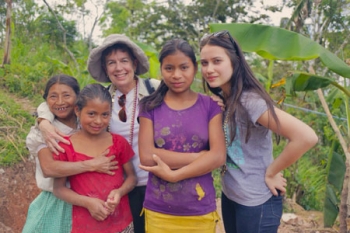
A Loyola University New Orleans team is spending Mardi Gras in El Guayabo, a small village in Guatemala, to capture on film an innovative approach proven to help villagers in the most impoverished regions stop the threat of Chagas disease and other illnesses caused by poor living conditions. Based on scientific research, the method has the power to change the developing world.
The Loyola team, including Loyola professor and Chagas disease expert Patricia Dorn, Ph.D., Loyola senior biology major Justine Sundrud and filmmaker Benjamin Reece of Deltree films, joins Guatemala-based researcher Carlota Monroy, Ph.D., on the project March 2-9.
The group will capture for the first time on film step-by-step instructions for implementing an ecohealth approach to stop the transmission of the deadly tropical Chagas disease. The Chagas parasite infects from 7 to 8 million people in Latin America and also people in the U.S., according to Dorn’s previous research. In 30 to 40 percent of victims, Chagas causes life-threatening heart disease.
“In terms of interrupting Chagas transmission, we realize that we need a holistic approach. The ecohealth approach includes an understanding of the environment,” Dorn said. While most might not consider the environment when addressing the issue of deadly parasitic diseases, the environment actually plays a major role. “In fact, because there’s so much deforestation in these areas around the world, the animals that the bugs usually feed on are gone, so the bugs are hungry. Where do they go? Into the houses. So you have to think holistically.”
The three-step approach includes first spraying houses with insecticide to initially knock out the bug population, then following up with innovative ecohealth measures some scientists had previously ignored or dismissed due to cost or feasibility. Those measures include improving the houses by plastering walls, moving chickens and other animals outside (by building coops) and cementing floors that were once only dirt.
“For years, everyone has said ‘we can’t afford to improve everyone’s house, it’s too expensive.’ But in fact, they’ve developed local materials such as volcanic ash and they make their own local ‘cement’—so so it’s now economically feasible,” Dorn said.
The method, developed by Monroy, and validated through her research with Dorn, was once only shared by person-to-person training performed by Monroy herself. While Monroy has traveled across the world from Central America to Thailand, Laos and beyond, she knew it was physically impossible for her to simply travel to teach the method to the thousands of people who need it most.
That’s where Loyola’s team comes in.
“We’re going to be filming the community members improving their own homes. So it’s really not about us going in and telling people what they need to do—it’s community based. It’s about empowering the villagers and giving them the tools to improve their own lives,” Dorn said.
Sundrud, the student, was inspired to join the project because of her own interest in public health.
“This project specifically, I’m really interested in it because first of all it is a neglected tropical disease and because everybody has a right to health,” Sundrud said. “And I like that it’s an ecohealth approach where it’s kind of holistic.”
The film, which will be formatted to a DVD to share with thousands around the world, is a sort of “Extreme Home Makeover” approach—only the ecohealth version. Highlighting the real-life stories of villagers from homes with rats, bugs and dirt floors in poor condition, the film will also feature villagers improving their own homes and showcasing the homes after they are improved. To capture this story, the team is enlisting the help of filmmaker Reece of Deltree who specializes in humanitarian film projects and comes from a public health background.
“I’m just excited to be a part of using the tools and technologies that I know so well to support making the world a better place,” Reece said. “It’s cool to be a part of a project that is really going to have an impact and affect the lives of a lot of people in a very direct way.”
While it may sound like just another film, it’s not. The team treats it like a passion project—investing personal funding along with grants—to help change many lives around the globe. The educational DVD project is supported by Dorn’s five-year National Science Foundation/National Institutes of Health grant to research ecology and evolution of infectious disease. Dorn’s parents, Ada and David Dorn, donated the money to fund the actual filming. Dorn also donated her inaugural community service award to purchase a motor bike for a village worker who is also helping with the project.
